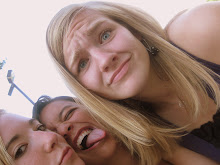A typical day here involves Arabic class at 8 followed by lectures which range from Palestinian literature, to history, to Isalm. We've also taken several fields trips this week to the cities of Hebron, Nablus, and East Jerusalem. We visited refugee camps, Herodium, and some local universities. We even took a whole day to hike the Wadi Qelt valley to Jericho. But everywhere we go I'm reminded of the reality of these people. Checkpoints, road blocks, walls, Israeli soldiers demanding ID... These people try to live their lives as normal as possible but from what I've witnessed, it seems near impossible. Things we never give a second thought to are huge obstacles to daily life. Will we have water this month? Will they stop importing food or health supplies without reason? Will we hit a checkpoint that may hold us for hours? All these are valid questions asked everyday.
Graffiti on the wall in Bethlehem
Our trip to Hebron was eye opening and devastating. Hebron is the largest Palestinian city in the West Bank. Although it is very much within the green line dividing Israel and Palestine, Israeli military has taken over the heart of the city. Settlers (many of which come from America) will perch themselves on top of a home and slowly take over. A place where half a million Palestinians live appeared to be a ghost town. Hebron is known for placing curfews on the Palestinians. Not a curfew as in be home by 12, or even off the streets by 10, but a 24 hour curfew requiring everyone to stay in their homes at all times. No working, no schooling, no shopping for basic needs. A man named Hashim was gracious enough to let us enter his home and hear his story. Hashim's house has been attacked several times, yet the only form of resistance that he uses is to stay put. He refuses to leave his home and rightfully so. For this reason Hashim has experienced violent retaliation in ways I cannot fathom. Just a few years ago it came time for his pregnant wife to give birth. Because of the destruction surrounding his house he is forced to snake through beaten pathways to enter or leave his home. He carried his wife down to the street where he was approached by a soldier. "Why the hell are you outside?" the soldier demanded. Hashim explained that he was taking his wife to the hospital because she was in labor. "Stop messing with me, you Palestinians are always lying." He begged and pleaded with the soldier to let him pass to which he responded, "go home, and let your wife die there." Hashim's wife miscarried their child, this is the second child she's lost, the first she lost when she was beaten by local settlers.
In light of my time here, I would rate this story low on shock value. Many of the things I have heard and seen are too raw and painful to even put into words. All of us on this trip are finding it hard to know what our role is as young Americans. And in many ways all we are asked to do is tell the truth. Let people know the things we are seeing and hearing. Let people know that there are educated, beautiful people living in this land. People that laugh, joke, cry, people with skin, with beliefs and thoughts. I passed a wall the other day where a settler had written, "Gas the Arabs." I didn't know if I should cry, yell, or get sick.
I understand that I am very much immersed in one side of the conflict. And please understand that I am in no way generalizing the Jewish or Israeli population. These attacks on Palestinians are coming mainly from a much smaller minority of extreme Zionist. I will have a long time to talk and hear about the Israeli stance while I spend the next month outside of Palestine. But what we need here is a call for humanity. On a more personal note, I've been challenged to ask myself if I see all people with untainted eyes. As equals, as brothers and sisters. Disregarding ethnicity, ability or disability, class, personality. I think we judge and react irrationally a lot more often than we'd like to believe. All people deserve to love and to be loved.
On a lighter note... we planted 200 olive trees the other day. And it was awesome.




